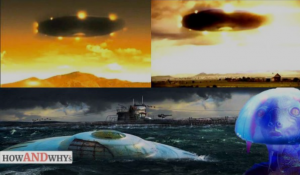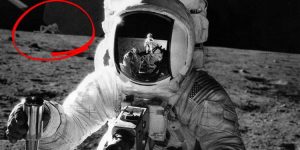Aliens And The Brookings Institution: Space-Life Report Could Be Shock

In the December 1960/January 1961 issue of the NICAP U̳F̳O̳ Investigator journal, a small article was published under the heading of “Space-Life Report Could be S̳h̳o̳c̳k̳.” It read as follows: “The discovery of intelligent space beings could have a severe effect on the public, according to a research report released by the National Aeronautics and Space Administration.
The report warned that America should prepare to meet the psychological impact of such a revelation. The 190-page report was the result of a $96,000 one-year study conducted by the Brookings Institution for NASA’s long-range study committee.”NICAP expanded further: “Public realization that intelligent beings live on other planets could bring about profound changes, or even the collapse of our civilization, the research report stated. ‘Societies sure of their own place have disintegrated when confronted by a superior society,’ said the NASA report.
‘Others have survived even though changed. Clearly, the better we can come to understand the factors involved in responding to such crises the better prepared we may be.’ Although the research group did not expect any immediate contact with other planet beings, it said that the discovery of intelligent space races ‘could nevertheless happen at any time.”

NICAP – the National Investigations Committee on Aerial Phenomena, which was a public U̳F̳O̳ research study group – continued: “Even though the U̳F̳O̳ problem was not indicated as a reason for the study, it undoubtedly was an important factor. Fear of public reaction to an admission of U̳F̳O̳ reality was cited as the main reason for secrecy in the early years of the AF [Air Force] investigation.
“Radio communication probably would be the first proof of other intelligent life, says the NASA report. It adds: ‘Evidences of its existence might also be found in artifacts left on the moon or other planets.’”NICAP further noted that the document gave weight to “…previous thinking by scholars who have suggested that the earth already may be under close scrutiny by advanced space races. In 1958, Prof. Harold D. Lasswell of the Yale Law School stated: ‘The implications of the U̳F̳O̳s may be that we are already viewed with suspicion by more advanced c̳i̳v̳i̳l̳i̳z̳a̳t̳i̳o̳n̳s̳ and that our attempts to gain a foothold elsewhere may be rebuffed as a threat to other systems of public order.’”
NICAP concluded: “The NASA warning of a possible shock to the public, from the revelation of more advanced c̳i̳v̳i̳l̳i̳z̳a̳t̳i̳o̳n̳s̳, support’s NICAP’s previous arguments against AF [Air Force] secrecy about U̳F̳O̳s. All available information about U̳F̳O̳s should be given to the public now, so that we will be prepared for any eventuality.”
The document to which NICAP was referring was titled Proposed Studies on the Implications of Peaceful Space Activities for Human Affairs. It was a document written by an employee of the Brookings Institution named Donald N. Michael. The report was contracted by the Committee on Long Range Studies, which was an arm of NASA, the National Aeronautics and Space Administration. The document was completed and provided to the House of Representatives in the 87th United States Congress on April 18, 1961.
More than half a century after it was completed, the document is still noted for its intriguing and controversial content, much of which has potential impact on the U̳F̳O̳ phenomenon. One of the most notable entries reads: “While face-to-face meetings with it will not occur within the next twenty years (unless its technology is more advanced than ours, qualifying it to visit earth), artifacts left at some point in time by these life forms might possibly be discovered through our space activities on the Moon, Mars, or Venus.”
It has been suggested by some U̳F̳O̳ theorists that this “artifacts” statement might imply Brookings and NASA had already uncovered data on – and secured photographs of – the controversial “Face on Mars.” The report then makes what can only be interpreted as a thinly veiled threat, regarding what the future might bring, if the presence of intelligent, ex̳t̳r̳a̳t̳e̳r̳r̳e̳s̳t̳r̳i̳a̳l̳ life in our midst was confirmed:
“Anthropological files contain many examples of societies, sure of their place in the universe, which have disintegrated when they have had to associate with previously unfamiliar societies espousing different ideas and different life ways; others that survived such an experience usually did so by paying the price of changes in values and attitudes and behavior.”
The Michaels paper continued: “Since intelligent life might be discovered at any time via the radio telescope research presently under way, and since the consequences of such a discovery are presently unpredictable because of our limited knowledge of behavior under even an approximation of such dramatic circumstances, two research areas can be recommended:
“Continuing studies to determine emotional and intellectual understanding and attitudes — and successive alterations of them if any — regarding the possibility and consequences of discovering intelligent ex̳t̳r̳a̳t̳e̳r̳r̳e̳s̳t̳r̳i̳a̳l̳ life.“Historical and empirical studies of the behavior of peoples and their leaders when confronted with dramatic and unfamiliar events or social pressures. Such studies might help to provide programs for meeting and adjusting to the implications of such a discovery.

Questions one might wish to answer by such studies would include: How might such information, under what circumstances, be presented to or withheld from the public for what ends? What might be the role of the discovering scientists and other decision makers regarding release of the fact of discovery?”
The questions were many. Granted they were theoretical, but they provoked raised eyebrows and concerned thoughts within NASA and the U.S. Government. An individual’s reactions to such a radio contact, said Brookings, “…would in part depend on his cultural, religious, and social background, as well as on the actions of those he considered authorities and leaders, and their behavior, in turn, would in part depend on their cultural, social, and religious environment.”
And, as the Brookings team also said: “The discovery would certainly be front-page news everywhere; the degree of political or social repercussion would probably depend on leadership’s interpretation of (1) its own role, (2) threats to that role, and (3) national and personal opportunities to take advantage of the disruption or reinforcement of the attitudes and values of others.
Since leadership itself might have great need to gauge the direction and intensity of public attitudes, to strengthen its own morale and for decision making purposes, it would be most advantageous to have more to go on than personal opinions about the opinions of the public and other leadership groups.”
Brookings highlighted an important issue that the conformation of a̳l̳i̳e̳n̳ life might have on the Human Race, as a whole: “The knowledge that life existed in other parts of the universe might lead to a greater unity of men on earth, based on the ‘oneness’ of man or on the age-old assumption that any stranger is threatening. Much would depend on what, if anything, was communicated between man and the other beings.”
One of the most controversial issues that occupied Brookings was that relative to the impact that the existence of a̳l̳i̳e̳n̳ life would have on the world of religion: “The positions of the major American religious denominations, the Christian sects, and the Eastern religions on the matter of ex̳t̳r̳a̳t̳e̳r̳r̳e̳s̳t̳r̳i̳a̳l̳ life need elucidation.
Consider the following: ‘The Fundamentalist (and anti-science) sects are growing apace around the world. For them, the discovery of other life – rather than any other space product – would be electrifying. Some scattered studies need to be made both in their home centers and churches and their missions, in relation to attitudes about space activities and ex̳t̳r̳a̳t̳e̳r̳r̳e̳s̳t̳r̳i̳a̳l̳ life.

“If plant life or some subhuman intelligence were found on Mars or Venus, for example, there is on the face of it no good reason to suppose these discoveries, after the original novelty had been exploited to the fullest and worn off, would result in substantial changes in perspectives or philosophy in large parts of the American public, at least any more than, let us say, did the discovery of the coelacanth or the panda.”
The Human Race stood a very good chance of having its collective ego bruised by a close encounter with a̳l̳i̳e̳n̳s, Brookings advised NASA: “If super intelligence is discovered, the results become quite unpredictable.It is possible that if the intelligence of these creatures were sufficiently superior to ours, they would choose to have little if any contact with us. On the face of it, there is no reason to believe that we might learn a great deal from them, especially if their physiology and psychology were substantially different from ours.”
Ironically, Brookings noted, those most likely to be “devastated” by the discovery of ex̳t̳r̳a̳t̳e̳r̳r̳e̳s̳t̳r̳i̳a̳l̳ life might not be the general public, but the scientific community – the very people looking for the a̳l̳i̳e̳n̳s. Brookings explained its stance on this matter thus:
“It has been speculated that, of all groups, scientists and engineers might be the most devastated by the discovery of relatively superior creatures, since these professions are most clearly associated with the mastery of nature, rather than with the understanding and expression of man.
Advanced understanding of nature might vitiate all our theories at the very least, if not also require a culture and perhaps a brain inaccessible to earth scientists.
“It is perhaps interesting to note that when asked what the consequences of the discovery of superior life would be, an audience of Saturday Review readership chose, for the most part, not to answer the question at all, in spite of their detailed answers to many other speculative questions.
“A possible but not completely satisfactory means for making the possibility ‘real’ for many people would be to confront them with present speculations about the I.Q. of the porpoise and to encourage them to expand on the implications of this situation.
“Such studies would include historical reactions to hoaxes, psychic manifestations, unidentified flying objects, etc. Hadley Cantril’s study, Invasion from Mars (Princeton University Press, 1940), would provide a useful if limited guide in this area.
Fruitful understanding might be gained from a comparative study of factors affecting the responses of primitive societies to exposure to technologically advanced societies. Some thrived, some endured, and some died.”
It’s this final sentence that humankind had – and still has – the most to worry about. If ex̳t̳r̳a̳t̳e̳r̳r̳e̳s̳t̳r̳i̳a̳l̳s – friendly or hostile – one day show themselves to us, there is a very good chance that, as the Brookings report noted all those decades ago, from a psychological perspective we might not survive the encounter, at least not intact.
By Nick Redfern (Nick Redfern is one of the world’s leading authorities on U̳F̳O̳s and the author of many important books, including Covert Agenda, Cosmic Crashes, Strange S̳e̳c̳r̳e̳t̳s etc.)







